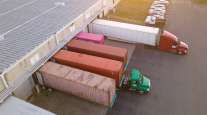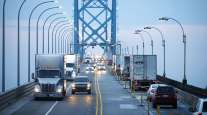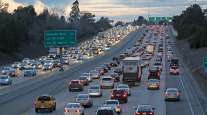California Transportation Bill and Proposed Gas-Tax Hike Advances to Senate Floor

SACRAMENTO, Calif. — A massive $52 billion transportation deal that would raise fuel taxes and vehicle fees to fix California’s pothole-ridden roads and unstable bridges cleared a key legislative committee April 3 as proponents race to meet a self-imposed April 6 deadline.
But with at least one key Democratic vote up in the air and no Republicans yet on board, the fate of the plan is far from certain — particularly because it requires two-thirds of both houses to agree it’s time to tell voters they need to pay more to fix California’s battered roads.
If it wasn’t clear how high the stakes were April 3, Gov. Jerry Brown, a Democrat, made a rare appearance in the Legislature to testify in favor of the transportation-upgrade deal announced with fanfare in the last week of March. The last time he did so, according to his press office, was in April 2014, when he was pushing for a ballot measure to strengthen the state’s budget reserve.
Brown argued that the Legislature needs to act now to pass the bill, which would raise $5 billion annually for public transit and road repairs through a 12-cent-per-gallon gasoline tax increase, new taxes on diesel and new vehicle registration fees. The proposal follows years of debate over how to pay to fix the growing number of chewed-up streets and crumbling bridges.
“I know this is a political concern because people don’t like gas taxes,” Brown told the Senate appropriations committee. “But what do you do?”
Supporters, including Brown, are hoping the amended Senate Bill 1 passes this week before lawmakers adjourn for spring recess. It passed Senate appropriations committee April 3 on a party-line vote. But the bill needs two-thirds of each house to vote “yes” to the unpopular act of raising taxes.
Democrats gained a legislative supermajority in November, but some leaders — including Sen. Steve Glazer (D-Orinda) — have yet to endorse the bill. Without Republican support, supporters need 81 out of 82 Democrats to agree to tax their constituents about $100 more per year to drive their cars — a tough task, despite California’s crumbling roads and bridges.
The cost of repairs has ballooned to $59 billion for state highways and $78 billion for local roads, according to state estimates, but opponents say the state should be doing a better job managing the funding it already generates through taxes and fees before asking for more.
Sen. Jim Nielsen (R-Roseville) and Sen. Pat Bates (R-Laguna Niguel) — who recently was elected Senate Republican leader — said April 3 they would vote against the tax increase. Nielsen argued California has not prioritized road safety enough and that higher taxes and fees would create too much of a burden on his constituents.
Nielsen said he was certain many Californians “are not enthusiastic about this” — even though they “are angry the roads have not been taken care of.”
Harold West, a retiree from San Jose, is one of them. Like many critics, he acknowledges the roads are terrible — but he doubts that the state is properly using the money it has to fix them.
“We’re just being taxed and taxed and taxed,” West said.
The bill’s authors also are contending with an outcry from the left — environmentalists concerned about a concession to commercial truckers, whose statewide association now supports the bill. The provision was amended April 4 to try to address the environmentalists’ concerns.
Sen. Jim Beall (D-Campbell) said the authors reached an agreement with the truckers, who “are heavily taxed” in the proposed plan, and the bill merely sets a schedule “to get rid of the dirty trucks.”
“This bill does no harm,” he said in an interview after the hearing.
Brown argued April 3 that the state’s roads will continue to break down, and if a fix doesn’t happen now, it might be many more years until the Legislature — and the next governor — have the political will to act.
“All the guys running for governor, they all want to be president so they’re not going to want to raise taxes,” he quipped. “You got a guy who’s going nowhere. I have no future. I only have a past.”
How the Money Would Be Raised
• $24.4 billion by increasing gasoline excise tax 12 cents.
• $200 million from an annual $100 “zero-emissions vehicle fee” beginning in 2020.
• $7.3 billion by increasing diesel excise tax by 20 cents.
• $3.5 billion by increasing diesel sales tax to 5.75%.
• $16.3 billion from an annual “transportation improvement fee” based on a vehicle’s value.
• $706 million in General Fund loan repayments.




